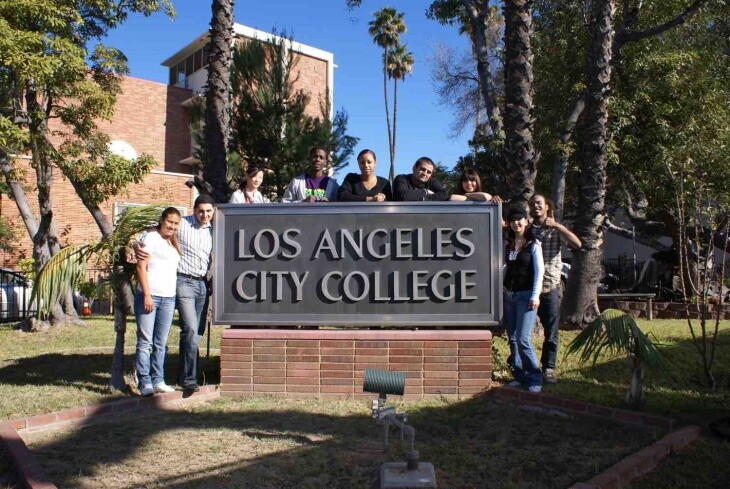Community Colleges Have Lost a Lot of Students During the Pandemic. Here's How One Campus Has Kept Theirs

The following article was originally republished March 18, 2021 through a collaboration with KPCC and LAist.
Story by Adolfo Guzman-Lopez
One year ago, Alexis Thomas-Hutchins found herself about to graduate from Carson High School — without her strongest supporter.
"My aunt that basically took care of me, and that I see as a second mother, passed away," she said.
The future looked uncertain. Thomas-Hutchins had missed the university application deadlines in November. Her aunt would have been the one to encourage her to find a way over the obstacle.
Then last May, she got a call from a counselor at Los Angeles City College (LACC). She had signed up to attend, and the counselor wanted to know if Thomas-Hutchins was still interested in enrolling — and if so, that there would be onboarding classes, financial aid, and other support for her every step of the way.
"I felt amazing. I felt like every tear that I had (shed) when I found out I couldn't get to my university because I couldn't meet the requirements was pushed aside," Thomas-Hutchins said.
The counselor's outreach, approach, and the support classes made available to her were part of an innovative LACC student outreach program two years in the making.
Campus administrators say this program has provided support that has kept the vast majority of LACC students enrolled during the pandemic, as other community colleges across California see double-digit enrollment drops.
LACC's student outreach program was born out of a different crisis three years ago.
A Dramatic Turnaround at a Historic LA College
Los Angeles City College traces its Vermont Avenue campus roots back to 1914, when a state teachers' college moved to the campus' current site on Vermont Avenue in Hollywood. From that school, LACC was born. The college became an essential institution of higher education in Southern California.Notable LACC alumni include actors Morgan Freeman and Mark Hamill, author Terry McMillan, and director Albert Hughes.
But by 2018, when Mary Gallagher took over as college president, the college had lost its way, she said.

"(LACC) was always this really tight knit family, and they kind of lost that a little bit," Gallagher said. "They were having financial problems because of the enrollment problems."
From 2014 to 2018, as statewide community college enrollment was growing, LACC lost 13% of its students.
Gallagher created a "customer service" approach that emphasized a caring aspect to outreach. The strategy came in part from her undergraduate and graduate degrees in business administration, as well from as a retail job that she'd held in college — as a customer service rep.
"I learned sometimes, the person who's complaining the loudest just needs to be heard. They just need some help," she said. "They're afraid nobody will help them, and students are very, very much like that, particularly if they try to access something and they have trouble accessing, whether in person or online."
LACC rolled out call centers and chat services to answer student questions about everything and anything having to do with going to college. Administrators created a First Year Experience program, headquartered in a remodeled welcome center on campus.
"It went from looking like a computer lab to looking more like an Apple store," said Alen Andriassian, LACC's acting vice president of student services.
The First Year Experience includes onboarding classes in the summer before a student's first semester. That onboarding is equal parts college skills workshops and school spirit rallies, much like those at four-year universities.
Like universities, LACC increased its recruitment staff who were tasked with reaching out to dozens of surrounding high schools to distribute information about the college, and make follow-up calls to convince students that L.A. City College would be a place where they could succeed in earning their two-year degree and transferring to a university.

Once students are enrolled, staff help them choose classes, tap into financial aid, navigate the campus bureaucracy, as well as get help with basic needs such as food and financial help for housing and transportation.
"We created strong relationships at the high schools, we transitioned the students, we gave them a support system," said Andriassian.
Thomas-Hutchins, now herself a first-year student, credits that support system with keeping her enrolled this past academic year.
"Any issue that has occurred with me, depression or mental breakdown, they have been super helpful with me, getting help, seeing what could benefit me," she said.
Community College Enrollment Drops Low During Pandemic
LACC's outreach program and the impact it has had on keeping students enrolled during the pandemic have attracted the attention of administrators in LACC's nine-campus community college district.
"It's absolutely remarkable," said Ryan Cornner, Vice Chancellor for educational programs and institutional effectiveness at the Los Angeles Community College District.
"City College was able to focus on retaining student headcount, and lost almost none of their students during the fall semester coming into this pandemic," Cornner said. "They've been focused on customer service and making sure that students have a venue to be effectively served. And that translated very well to supporting students, even in a pandemic."
The district's other colleges have adopted LACC's call center and digital support model.
However, Cornner warned that LACC's strategies may not lead to the same results in other communities. The pandemic's health and economic effects have hurt neighborhoods disproportionately around the district's other campuses, notably Los Angeles Southwest College, in an unincorporated part of L.A. County next to Inglewood that has high poverty rates and low access to health care.
"Students, when they're thinking about basic needs, and when they're struggling economically with some of the unemployment that was the result of the pandemic, have just had to focus on those needs," he said, "rather than looking towards being able to receive higher education."
A Strong Recovery Depends on the Health of Community Colleges
The community college drop-out rate is troubling to people who study the interaction of higher education and local economies, who point to the California community college system's massive size: two million students enrolled across 116 campuses.
Researchers estimate that nearly 10% of the state's community college students dropped out during the pandemic. That translates into roughly 200,000 students dropping out throughout California.
"You're losing the taxpayer base," said USC education researcher Tatiana Melguizo, "you're losing the opportunity for these brilliant Latino and African American kids to get a degree and pay back to the state with amazing jobs, nursing jobs, STEM jobs. It's a huge loss."
That's because the bulk of those suspending their higher education are Black and Latino students. Melguizo believes the answer is to increase the amount of financial aid and liveable wage jobs for these students, because many of them are torn from their studies by high housing, food, and transportation costs.

"I don't think we will continue to see further drops. I think we probably have bottomed out in that regard," said Tom Brock, director of the Community College Research Center at Teachers College, Columbia University.
"I think that the big question is, will they ever return?" he said.
Strong outreach programs like those at LACC are likely to help keep more students in and help bring back those who have left, Brock said.
LACC freshman Thomas-Hutchins now has a strong identity as an L.A. City College student, even though she has only set foot on campus twice in nearly a year due to the pandemic: once to pick up a computer and another time to pick up textbooks.
Her identity as an LACC student comes from how the institution has helped her grow. She is grateful for the support she's received from LACC counselors and staff since last May, when she took a call from that helpful counselor. The staff has helped her obtain a computer and found a paid internship for her, working with youth. Now she's focused on her hopeful career path.
Thomas-Hutchins wants to go to law school.
"I don't know where I would be, maybe still struggling in life, trying to figure out who I am," she said.









